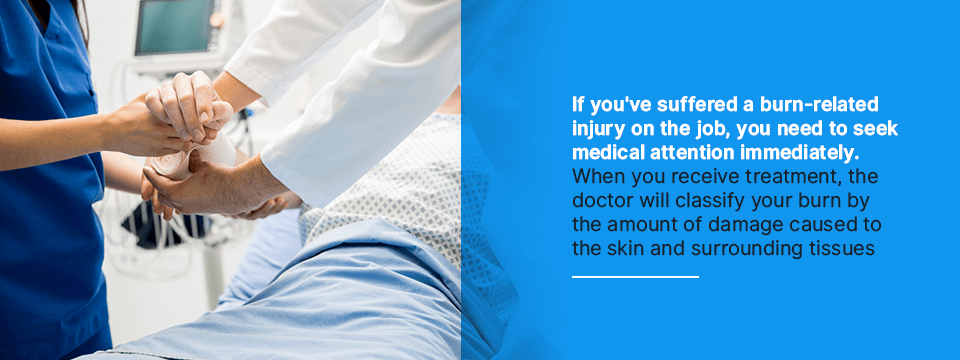
It’s been a hectic morning at work at the restaurant. You’ve barely had time to converse with the regulars. You’ve poured a Niagara Falls of coffee for thirsty customers. As you’re moving to serve someone at the end of the counter, a co-worker accidentally hits your hand, and the coffee spills all over your arm. It is very hot coffee. It hurts so much you scream. The burn looks bad.
Across town, an auto body shop has just open for the day. Auto mechanics move into the garage, talking about last night’s football game, ready to start fixing a variety of vehicles. One of the mechanics thinks he can save himself a few seconds by not getting a step stool. He reaches to grab a container of a chemical he needs to clean a radiator. It’s on a high shelf.
He reaches and reaches but can’t quite get it. With one last lunge, he knocks the can. Unfortunately, it falls forward and spills the corrosive chemical onto the side of his face. He needs medical attention right away.
These are just some of the kinds of cases that arise daily in Pennsylvania, where workers in a variety of jobs suffer burns. Some are minor, while some cause serious injuries. Since both workers in these examples were injured on the job, they may be entitled to workers’ comp benefits. What are they and how do you qualify? Our Harrisburg work injury lawyers put together a guide to answer all your questions, such as “can I collect workers’ comp for burn injuries” and “what happens with burn lawsuits.”
Causes of and Statistics About Burn Injuries in the Workplace
Burn injuries happen often. In 2017 in Pennsylvania, 3,320 workers suffered work-related burns in sectors ranging from manufacturing to transportation to agriculture to retail services and mining. The ways a worker can be burned on the job depend on where they work and the materials with which they work.
Types of Burn Injuries in the Workplace
Fire remains the most common cause of serious burns, but workers can suffer burns in other ways, such as:
- Electrical burns
- Burns from explosions
- Chemical burns
- Thermal burns caused by hot liquids, coals, steam or other hot gaseous materials
- Radiation burns
Degree Ratings for Burns

If you’ve suffered a burn-related injury on the job, you need to seek medical attention immediately. When you receive treatment, the doctor will classify your burn by the amount of damage caused to the skin and surrounding tissues. Burns fall into four categories.
1. First-Degree Burns
These are minor burns, the kind you get if you accidentally touch the hot burner on the stove for a moment or pick up a scorching plate from the microwave. A first-degree burn affects your outer layer of skin. Pain and redness are the most common symptoms and are most often treated by standard first aid.
2. Second-Degree Burns
Also known as partial-thickness burns, they injure your epidermis, the skin’s outer layer, and some of the second layer, the dermis. Second-degree burns can be caused by boiling water, the sun, electricity, chemicals or open flames.
A second-degree burn is usually very painful. A second-degree burn often requires more than a first-aid kit, particularly if the burn covers a large area of the body. These burns can take several weeks to heal and, if not treated properly, can become infected.
3. Third-Degree Burns
A third-degree burn is a serious one that affects every layer of skin. One common misconception about a third-degree burn is that it is very painful. This may not be the case as a third-degree burn goes so deep it may damage the nerves.
Symptoms of third-degree burns include skin that is a waxy, white color, charred skin, skin that is of a leathery and raised texture and/or blisters that do not develop. A third-degree burn almost always requires surgery, or else it will leave permanent scarring.
4. Fourth-Degree Burns
An extremely serious burn, often fatal, is a fourth-degree burn. A fourth-degree burn not only affects every layer of skin but also muscle and bone. Major scarring, along with extensive nerve damage, blistering and disfigurement are the frequent results of a fourth-degree burn.
Fourth-degree burns may happen around a hot stove, hot iron or open flame such as in a fireplace or at a campsite. They also are caused by building or vehicle fires or from chemicals. As with a third-degree burn, the burn victim may not feel any pain since nerves have been extensively damaged.
These burns need to be treated immediately and often require hospitalization in a burn unit. Fourth-degree burns sometimes require amputation if a limb has been injured severely.
What to Do If You Suffer a Burn at Work
If you have suffered a work-related burn injury, you could receive workers’ compensation benefits. You need to seek immediate medical attention and report the burn to your supervisor or employer.
Even if the burn seems minor, don’t assume you can tough it out. Minor burns can have serious consequences. Minor electrical shock, for instance, can result in internal damage to organs. An infected burn can keep you off the job for a long time.
It’s also important to report seemingly minor burns for another reason. If you don’t report a burn injury immediately or as soon as you can, your employer’s insurance company may deny you benefits. Don’t give them a reason to deny your claim because you didn’t report the burn right away.
If you suffer a serious burn injury in a work-related incident, you need to seek immediate medical attention. A severe burn can leave you permanently disfigured or disabled. If you are undergoing medical treatment, report the injury as soon as you can so you can file a workers’ compensation claim and it will not be delayed.
Workers’ Comp for Burns in PA
An injured worker may be entitled to workers’ compensation benefits under the Pennsylvania Workers’ Compensation Act if they are hurt on the job. Workers’ compensation pays all medical expenses related to the injury as well as wage-loss compensation equal to two-thirds of the worker’s average weekly wage.
A worker burned in a work-related accident may also be entitled to receive Specific Loss Benefits. This scheduled benefit is determined by the severity of a disfigurement to the head, neck or face of the injured worker. If any other body part is disfigured by a burn, the worker is not entitled to Specific Loss Benefits unless the burn results in the loss of the use of that body part.
The benefit does not depend on whether the worker can return to their job. Even if an employee can work full-time, they may still receive Specific Loss Benefits. The amount awarded depends on the severity of the disfigurement:
- This benefit is based on two-thirds of the worker’s average weekly wage and the maximum Specific Loss Benefit for disfigurement of the face, neck or head, which is up to 275 weeks.
- A workers’ compensation judge examines the injured worker during a hearing and determines the number of weeks paid our for the disfigurement.
How Does Workers’ Compensation Work In Pennsylvania?

In Pennsylvania, any business or individual who employs more than one person is required to carry workers’ compensation insurance. Part-time and seasonal workers are also covered under the plan. There are some exceptions:
- Railway workers, longshoremen and federal employees have their own form of workers’ compensation and are exempt from the state version.
- Some agricultural workers — those who work less than 30 days or earn less than $1,200 in a calendar year, as well as any spouse or minor children of the owner of an agricultural business who doesn’t ask to be placed on workers’ compensation — are exempted from the plan.
- Exemptions awarded because of religious beliefs.
- Executives in some corporations.
- Independent contractors are not covered by the plan. Employers and their insurance companies will sometimes attempt to misclassify full-time workers as independent contractors to avoid paying workers’ compensation benefits. If you think this has happened to you, contact an experienced workers’ compensation attorney as soon as possible.
Restrictions on PA Workers’ Comp Claims

Filing for workers’ compensation for burn injuries at work requires following strict guidelines. Here are some things to keep in mind as you file your claim:
- If you have been injured in a workplace accident, you have 120 days to report it to your employer. You should never wait this long, however, as your employer or their insurance carrier will try to argue you were not actually hurt because you waited so long to report your injury. Report any injury as soon as possible.
- In some cases, such as with carpal tunnel syndrome or other work-related illnesses, a worker may not be aware that they are sick or have been hurt. As soon you are diagnosed by a physician with either an injury or an illness, you have 120 days from that point to notify your employer.
- If your employer or their insurance carrier refuse to pay workers’ compensation benefits, you have three years from the day you were injured or from the day you were notified of your injury or your illness to file a workers’ compensation claim.
- If your employer and their insurance company decide to pay you workers’ compensation benefits or if a workers’ compensation judge upholds your appeal, you are entitled to receive compensation for all medical costs related to your illness or injury. This includes any transportation costs if you need to travel to see a doctor. You are also entitled to two-thirds of your average weekly wage.
- There is a wage-loss maximum amount that you can receive in Pennsylvania. The current maximum is $1,049 a week, although it is adjusted every year.
- Injured workers are also eligible to receive Specific Loss Benefits such as those mentioned above for disfigurement of the head, neck or face. Specific Loss Benefits may be awarded for the loss of specific body parts.
If a workers’ compensation judge denies your initial appeal, you have several levels of appeal beyond that denial. You should work with an experienced workers’ compensation attorney who will help you with all your appeals if more than one is needed.
Settling Your Burn Injury Case
Often employers and their insurance companies seek settlements with injured workers. If you have been approached by your employer or their insurance carrier about a settlement, do not sign or accept anything without first talking to an experienced workers’ compensation attorney. Insurance carriers are notorious for trying to trick injured workers, who may not feel their best, into signing settlements for reduced sums.
There are some reasons you may decide to settle your burn injury case:
- You are tired of the case dragging on, and you want closure.
- You have been offered a new job, but you need to wrap up your injury burn case first.
- You need to pay medical bills or other bills, and a settlement would help you.
There are also reasons you may not want to seek a settlement if your employer or its insurance company offers one:
- As a precondition of accepting a settlement, the insurance company requires you to leave the company, but you enjoy your job and the work that you do, even if you work with medical restrictions.
- The settlement offer from your employer or the insurance company is not fair.
- You have not yet reached Maximum Medical Improvement (MMI). This is the point where your doctor believes you have healed as much as you’re going to heal. No injured worker should sign a settlement before they reach MMI. Before that, it’s hard to tell how much you will have to pay in medical costs for future treatments.
An experienced workers’ compensation attorney can help you decide whether to accept a settlement offer from your employer or its insurance company. They can also ensure your concerns are dealt with fairly and you receive the maximum benefits.
Benefits of Working with a Workers’ Compensation Lawyer
Being injured in any work-related accident can be a painful and frustrating experience, especially if your employer or their insurance company denied your workers’ compensation claim. In order to appeal this denial, you need to collect evidence and medical testimony that proves your case. That’s a tall order for someone worried about how they will provide for their family and who also may be embarrassed by a scar caused by severe burns.
When you work with an experienced workers’ compensation attorney, they will help you prepare your case. They make sure you receive the proper medical treatment. They find the medical experts who can testify on your behalf about the seriousness of your injury.
An experienced workers’ compensation lawyer knows a lot about the tricks and schemes employers and their insurance companies play on injured workers. Employers and their insurance companies hate to pay workers’ compensation benefits. They will do everything to deny the claim outright or pay as little as possible.
Since experienced workers’ compensation attorneys work on these kinds of cases full time, they know what methods the employers’ insurance company will use to deny workers’ claims. When you work with an experienced workers’ compensation attorney, you have someone on your side to help when you may be least able to help yourself.
Contact the Experienced Workers’ Compensation Lawyers at Calhoon and Kaminsky P.C.
Are you seeking workers’ compensation for a burn injury in PA? Calhoon and Kaminsky P.C., can help. We offer a free evaluation of your work-related burn injury. If you can’t come and see us, we will come to you and discuss your workers’ compensation claim. We want to help our clients receive fair treatment by the Pennsylvania workers’ compensation process and receive the benefits to which they are entitled. Our free guide explains more about workers’ compensation in PA.
If you would like to talk to one of our experienced workers’ compensation attorneys, call us at (717)-695-4722 or visit our contact page, where you can leave us your contact information and tell us about your case. A member of our team will get back to you as soon as possible.






